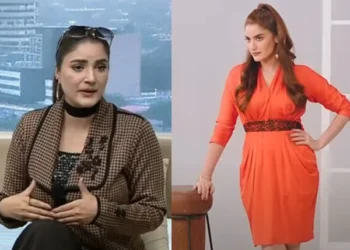Karachi, Pakistan – Popular television and film actress Zara Noor Abbas has stirred an emotional and thoughtful conversation on social media by posting a heartfelt message in praise of the joint family system. Her words have resonated deeply with fans across Pakistan and the wider South Asian diaspora, bringing renewed attention to a traditional family structure that many feel is slowly disappearing in the modern world.
In a world increasingly driven by individualism and nuclear family setups, Zara’s message has reignited public discourse on the emotional, psychological, and social benefits of intergenerational households—a hallmark of South Asian culture for centuries.
The Viral Post: Zara’s Ode to Togetherness
Zara Noor Abbas took to Instagram, a platform where she commands a following of millions, to post her support for the joint family system. In her emotionally charged caption, she wrote:
“During the time of our elders, families were close-knit. People would walk to each other’s homes, eat together, raise children collectively, and face life’s challenges as one unit. Life seemed easier. We need to bring this system back. Long live the joint family system.”
The post quickly went viral, amassing thousands of likes, shares, and comments. Fans and fellow celebrities alike praised the actress for touching on such a significant social issue in a time when many people feel increasingly isolated and disconnected.
Understanding the Joint Family System: A Cultural Legacy
The joint family system—a household structure in which extended family members such as grandparents, uncles, aunts, cousins, and married siblings live together—has long been an integral part of Pakistani, Indian, and broader South Asian culture.
Core Characteristics of the Joint Family System:
- Shared responsibilities, especially in child-rearing and elder care
- Collective decision-making
- Economic pooling of resources
- Emotional and moral support in crises
- Respect for senior family members as decision-makers
Historically, this structure provided stability in uncertain times, a sense of belonging, and ensured that no one in the family felt truly alone—qualities that are being missed in today’s fast-paced urban lifestyles.
The Context: Why Zara’s Message Resonated Deeply
Zara Noor Abbas’s advocacy for the joint family system comes at a time of growing concern about loneliness, depression, and societal detachment, especially among women, the elderly, and urban youth. Her post struck a chord for multiple reasons:
Recent Tragedies Reinforce the Message
Zara’s post followed closely on the heels of two high-profile and deeply saddening incidents:
- The body of 10-month-old actress Humaira Asghar was discovered in the flat where she had been living alone. Her passing shocked the entertainment industry and the public.
- Similarly, senior actress Ayesha Khan was found dead in her apartment, also having lived alone. Both deaths were reminders of the emotional and social consequences of isolation.
Although the causes of death varied, both tragedies highlighted the perils of living alone, particularly for vulnerable individuals. Zara’s statement, though not directly referencing these events, appears timely and compassionate.
Public Reaction: An Outpouring of Support
Within hours of Zara’s post, social media was flooded with supportive comments from fans, influencers, and even sociologists who emphasized the need for social systems that combat urban isolation.
Notable Comments from Fans and Public Figures:
- “Zara, you’ve said what so many of us feel but can’t express. Thank you for this reminder.”
- “I live abroad and miss my joint family terribly. Raising kids alone in a foreign country is the hardest thing.”
- “We need to revive our traditions. They kept us grounded and supported.”
Her words sparked conversations on forums like Twitter, Facebook, and Reddit, where users shared personal experiences of living in joint families or struggling in nuclear setups. Some even tagged mental health experts to weigh in on the psychological impact of family support systems.
The Mental Health Angle: A Growing Crisis
Mental health issues are on the rise globally, and Pakistan is no exception. Studies by the Pakistan Psychiatric Society indicate that one in four people in the country is affected by mental health concerns, including depression, anxiety, and loneliness.
Why the Joint Family System Helps:
- Companionship: Reduces the feeling of isolation and provides emotional outlets.
- Role Distribution: Eases the burden of responsibilities like parenting, housework, and elder care.
- Crisis Management: Families come together in tough times—financial, medical, or emotional.
Mental health practitioners often emphasize the importance of social support networks in treating depression and other emotional disorders. In this context, Zara’s message serves as more than just nostalgia—it’s a practical societal recommendation.
Changing Times: The Shift to Nuclear Families
Despite the many benefits, the joint family system has been on the decline, especially in urban areas like Karachi, Lahore, and Islamabad.
Contributing Factors:
- Urbanization and housing shortages
- Career mobility and job relocations
- Conflicts and lack of privacy in large households
- Western influence and cultural shift toward independence
As more people opt for nuclear family living or solo lifestyles, the disconnect from extended family traditions grows, leading to a weakened sense of community and shared responsibility.
Zara Noor Abbas: A Voice Beyond the Screen
Known for her powerful roles in dramas such as Ehd-e-Wafa, Zebaish, and Badshah Begum, Zara Noor Abbas has gradually evolved into more than just an actress. She is becoming a cultural influencer, using her platform to advocate for social issues including mental health awareness, women’s empowerment, and now, the preservation of traditional family values.
Her followers admire her for her authenticity, relatability, and courage in speaking on taboo or overlooked topics—an increasingly rare trait in an industry often focused solely on glamour.
Criticism and Counterpoints
While Zara’s post received overwhelming praise, a few users offered constructive criticism, noting that:
- Not all joint family experiences are positive. Family politics, generational conflict, and lack of privacy can make such setups difficult.
- In some cases, women face the brunt of compromise and loss of autonomy in joint households.
However, most agreed that the essence of togetherness and mutual support can still be retained with modern adaptations—such as nearby extended family housing or frequent inter-family gatherings—even if cohabitation isn’t possible.
Conclusion: A Call to Reconnect With Our Roots
Zara Noor Abbas’s message in praise of the joint family system is more than just a tribute to tradition—it’s a wake-up call to reassess our priorities in an increasingly disconnected world. By drawing attention to the emotional security, shared joy, and collective resilience that joint families offer, Zara has tapped into a deep cultural and emotional reservoir among her audience.
Whether or not society returns to full-scale joint living, the values of interconnectedness, empathy, and shared responsibility remain timeless. In an era marked by digital connection but emotional disconnection, Zara’s voice offers a beacon of warmth, urging us to come closer—both physically and emotionally—to those who matter most.

























